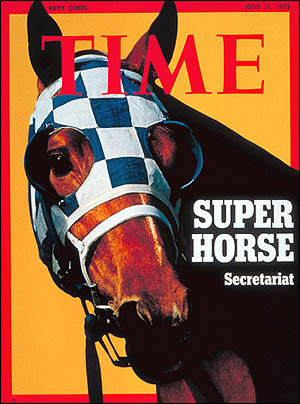With all the interest in the new Disney film Secretriat, consider these thoughts from Legendary Heroes By Scott T. Allison and George R. Goethals, authors of Heroes: What They Do and Why We Need Them.
Secretariat’s performance is noteworthy in the context of the nation’s state of mind. Sporstwriter George Plimpton says he was the “only honest thing in the country” in 1973. With Vietnam and Watergate, our national confidence was at a low point. And, along came a horse. Much like the 2003 film Seabiscuit, which spun the yarn of a scrappy, underdog of a horse that gave people pride and hope during the Great Depression, Secretariat the movie may have good timing as well.
 The current cinema often reveals either the creation or the reworking of hero narratives. Drama in the movies emerges from the struggles that make heroes so engaging, especially underdog heroes. But it's not always the underdog that becomes the hero. No better example is that of a non-human hero about to be celebrated in film this coming October. That individual is the racehorse Secretariat.
The current cinema often reveals either the creation or the reworking of hero narratives. Drama in the movies emerges from the struggles that make heroes so engaging, especially underdog heroes. But it's not always the underdog that becomes the hero. No better example is that of a non-human hero about to be celebrated in film this coming October. That individual is the racehorse Secretariat.
Secretariat burst onto the national consciousness in 1973. It had been twenty-five years since the great horse Citation had won racing's triple crown: the Kentucky Derby, the Preakness, and the Belmont Stakes. After Secretariat won the first two races, millions of people rooted for him to win the Belmont, the final trial. As race day approached, he was the favorite, not the underdog. But in some ways the challenge of the Triple Crown itself made him an underdog and the sentimental as well as the betting favorite.
Secretariat was born in Caroline County, Virginia in 1970. As a two-year old he enjoyed spectacular success and was voted horse of the year, a rarity for so young a colt. A very large chestnut horse with distinctive white markings, he was nicknamed "Big Red." His fame slowly spread outside of the racing world. His great strength and grace inspired many.
Going into his third year of racing Secretariat was highly touted. Even though he finished a disappointing third in the race just before the Kentucky Derby, he was the betting favorite. Secretariat didn't disappoint. He not only won the Derby, but also set a record that still stands. In the second Triple Crown race, the Preakness, Secretariat won handily, but didn't break the record. Or did he? There is controversy about the exact time, as there were problems with the official clock. The Daily Racing Form claimed that Secretariat actually did break the record. Since then three other Preakness winners have tied the Racing Form's alleged time for Secretariat. But none has beaten it.
There's absolutely no controversy about the Belmont record. Secretariat won that race by 31 lengths, and it is estimated that he would have beaten the previous record holder by 11 lengths. The Belmont is one and a half miles, the longest of the Triple Crown. During the race his trainer thought that jockey Ron Turcotte would cause Secretariat to have a heart attack. He was going too fast in the early going. But the horse wanted to run that day, and he turned in one of the legendary performances in all of racing's history.
There are numerous stories about Secretariat's greatness. One notes that Secretariat was a large horse with a big rear end. It often took him awhile to get up to full speed. Amazingly, during his Kentucky Derby win, he ran each of the five quarter miles faster than the previous one. He kept accelerating for the entire race.
There were two other Triple Crown winners in the 1970s, Seattle Slew in 1977 and Affirmed the next year. But none was regarded as quite the hero that Secretariat was. His performances weren't equaled then, and they haven't been since. He raced for a short time after his triple crown victories in 1973, but was limited to stud duties once his racing career was over. He died in 1989.
We'll see in the Fall whether Disney tells the true story of Secretariat, as promised. It will be tempting to embellish the legend. But the actual facts are heroic enough.
